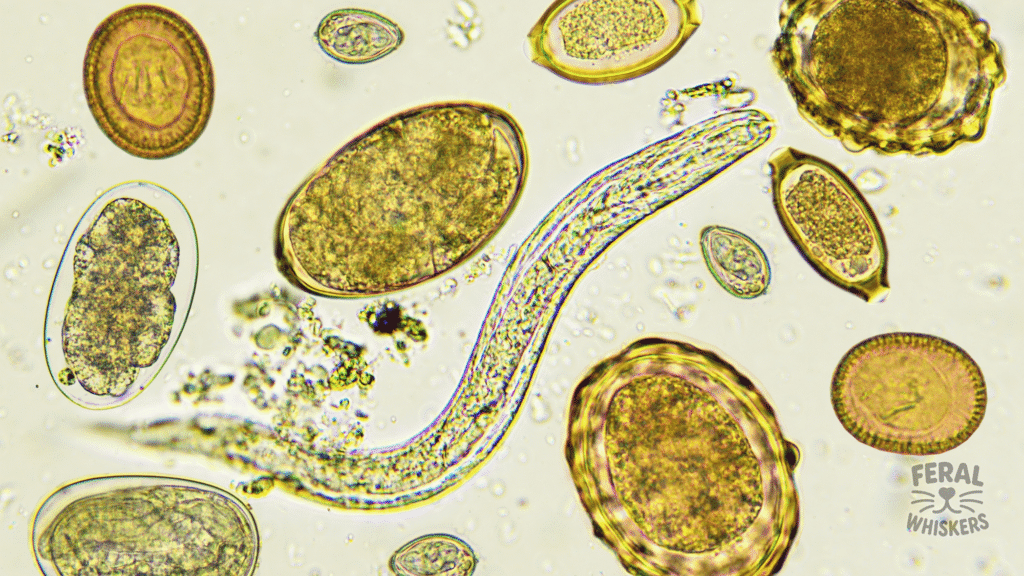📌 Why You Should Care About Intestinal Worms

Intestinal worms (roundworms, hookworms, whipworms, tapeworms) are some of the most common parasites in dogs. They live in your pup’s intestines, stealing nutrients and sometimes causing serious illness. Puppies are especially vulnerable, but adult dogs can get them too.
The scary part? Some of these worms can also infect humans — especially small children.
But don’t worry — with the right knowledge, worm prevention and treatment are very manageable.
1. The Culprits: Common Worms in Dogs
🌀 Roundworms (Toxocara, Toxascaris)
- Look like spaghetti noodles.
- Very common in puppies (they can get them from their mother’s milk).
- Can spread to humans, causing “visceral larva migrans” (worms travel through body tissues).
🩸 Hookworms (Ancylostoma, Uncinaria)
- Tiny, attach to the intestine, and suck blood.
- Cause anaemia, weakness, bloody diarrhea.
- Can infect humans through bare feet (cutaneous larva migrans).
🪢 Whipworms (Trichuris vulpis)
- Live in the large intestine.
- Can cause bloody diarrhea, weight loss, and dehydration.
- Eggs are very hardy and can survive in soil for years.
🐛 Tapeworms (Dipylidium caninum, Taenia)
- Flat, segmented worms.
- Commonly spread through fleas (dogs swallow a flea carrying tapeworm larvae while grooming).
- Seen as little “rice grains” around the anus or in poop.
2. How Dogs Get Worms
- From mom: Puppies can get roundworms from their mother before birth or through her milk.
- From the environment: Worm eggs live in soil, parks, and even sidewalks where infected dogs have pooped.
- From fleas: Tapeworms come from eating infected fleas.
- From hunting/scavenging: Eating raw meat, dead animals, or wildlife can lead to worm infections.
3. Spotting the Signs: Symptoms of Worms in Dogs
Many dogs with worms show no symptoms at first, especially healthy adults. Puppies, sick dogs, and seniors usually show symptoms earlier.

Common Signs:
- Pot-bellied appearance (especially in puppies) 🍼
- Diarrhea, sometimes with blood 💩
- Vomiting (sometimes with worms in it 🤢)
- Weight loss despite eating normally
- Dull, rough coat
- Itchy rear end (dogs scooting on their bottom)
- Pale gums, weakness (from hookworm anaemia)
- Segments of tapeworm that look like rice near the dog’s anus or bedding
⚠️ Severe infections in puppies can cause death if not treated quickly.
4. How Vets Diagnose Worms
4.1 Fecal Test (Poop Exam)
Vets take a stool sample, mix it with a solution, and look under a microscope for worm eggs. This is the gold standard for diagnosing most worms.
4.2 Physical Signs
- Tapeworms are sometimes spotted without a microscope (rice-like segments in poop).
- Severe roundworm infections → worms can be vomited up.
4.3 Routine Check
Most vets recommend annual (or bi-annual for puppies) fecal exams as part of preventive healthcare.
5. Vet-Recommended Treatment
The good news: worms are very treatable with safe medicines.
5.1 Common Dewormers
| Worm Type | Medication Examples | Notes |
|---|---|---|
| Roundworms + Hookworms | Fenbendazole, Pyrantel Pamoate | Safe, effective, often in “puppy dewormer.” |
| Whipworms | Fenbendazole, Milbemycin Oxime | Often requires longer treatment (3 days, repeat in 3 weeks, then again). |
| Tapeworms | Praziquantel | Specific for tapeworm; often combined with flea treatment. |
5.2 Deworming Schedule for Puppies
- At 2, 4, 6, 8 weeks old → deworming (roundworms/hookworms).
- Then monthly until 6 months.
- After 6 months → follow adult schedule.
5.3 Adult Dogs
- Routine broad-spectrum preventives (monthly chew/spot-on like Simparica Trio, NexGard Spectra, Interceptor Plus).
- Fecal exams yearly.
⚠️ Puppies or heavily infested dogs may pass visible worms in stool after first treatment — gross but normal!
6. Prevention: Stopping Worms Before They Start
- Pick up poop daily: Don’t let eggs build up in the yard!
- Use monthly preventives: Many flea/tick preventives also cover worms.
- Control fleas: Flea prevention also prevents tapeworm.
- Don’t feed raw meat unless freeze-treated: Wildlife and raw meat are major worm sources.
- Keep dogs away from carcasses and feces.
- Regular vet checkups.
7. Holistic & Budget-Friendly Care
Vet meds are the safest treatment if your dog has worms. But for fur parents with financial struggles, or as prevention, there are natural aids that support gut health and help keep parasite loads lower. (⚠️ Not a replacement if your dog is severely wormy or sick!)
7.1 Natural Deworming Foods / Supplements
- Pumpkin Seeds 🎃: Raw, ground pumpkin seeds contain cucurbitacin, which may paralyze worms.
- Dosage: 1 tsp per 10 lbs body weight daily, mixed into food.
- Grated Carrots 🥕: Help mechanically push worms through intestines.
- Coconut Oil 🥥: Has anti-parasitic benefits; 1 tsp per 10 lbs added to meals gradually.
- Garlic (tiny doses): Can reduce worm loads by making the gut less friendly for parasites. (Vet supervision advised).
7.2 Herbal Support (Holistic Vets Use)
- Diatomaceous Earth (Food Grade): Added in tiny amounts to food; believed to cut through parasite exoskeletons (scientific evidence limited, but widely used).
- Wormwood, Black Walnut, Cloves: Classic herbal worm remedies, but ⚠️ strong and potentially toxic if overdosed. Should ONLY be used with a professional holistic vet’s guidance.
7.3 Gut & Immune Strengthening
Even if you can’t afford meds monthly, you can make your dog less attractive to parasites by keeping their gut flora strong:
- Add probiotics (kefir, yogurt, probiotic supplements).
- Balanced homemade diet or best quality kibble possible.
- Avoid sugar/starch-heavy foods (worms thrive in them).
8. Step-by-Step Plan for Fur Parents (Budget-Friendly)
- 🐾 Puppies: Deworm starting at 2 weeks old if possible. Cheap over-the-counter pyrantel pamoate (“puppy dewormer”) is often available at farm stores.
- 🐾 Adults: Do a fecal test yearly (many shelters or clinics offer low-cost testing).
- 🐾 If unable to access a vet:
- Add ground raw pumpkin seeds daily.
- Add grated carrots to meals weekly.
- Keep yard clean.
- Use food-grade DE sparingly in meals.
- 🐾 If dog shows signs (bloated belly, bloody diarrhea, weakness):
- Vet visit is urgent. Holistic food alone will NOT save a puppy with hookworm anemia.
- 🐾 Prevention long-term: Keep fleas away (for tapeworm), pick up poop daily, keep food/water clean.
9. FAQs
Q1: Can I catch worms from my dog?
Yes! Roundworms & hookworms can infect humans, especially kids who play in contaminated soil. Always wash hands after handling dogs or cleaning poop.
Q2: My dog passed worms after dewormer — is that normal?
Yes. It means the medicine is working. Continue treatment as prescribed.
Q3: Can I just use pumpkin seeds instead of medicine?
Pumpkin seeds help reduce worm load but are not a full replacement for medication. Use as prevention between vet deworming.
Q4: My dog has diarrhea — does it mean worms?
Not always. Diarrhea can be from food changes, infections, stress, or worms. A stool sample helps confirm.
Q5: How often should I deworm my dog?
- Puppies: Every 2 weeks until 8 weeks, then monthly.
- Adults: Monthly preventives OR every 3-6 months if using standalone dewormers.
10. Common Concerns & Simple Answers
| Concern | Simple Answer |
|---|---|
| “My dog lives indoors, so they don’t need deworming.” | Not true. Worm eggs can be tracked inside on shoes, fleas bring tapeworms, and mosquitoes (heartworm) enter homes. |
| “Dewormers are too harsh.” | Modern dewormers (pyrantel, fenbendazole) are very safe when dosed correctly. Far safer than leaving worms untreated. |
| “I can’t afford monthly preventives.” | At least do yearly fecal tests + use natural supports like pumpkin seeds. Prevention is cheaper than vet bills for severe illness. |
| “I’ve never seen worms in poop, so my dog is safe.” | Many worms are microscopic or shed eggs only sometimes. Visible worms = heavy infestation. Always test regularly. |
Conclusion: Keeping Your Dog Worm-Free
Intestinal worms are common but very controllable with the right mix of vet care, prevention, and good hygiene. Puppies are the highest risk and need routine deworming, while adults benefit from yearly tests and preventive meds.
For fur parents on a budget, natural foods like pumpkin seeds, carrots, probiotics, and coconut oil help make your pup’s gut less worm-friendly. Combine that with daily poop pick-up and flea control, and you’ll greatly reduce the risk.
🐾 Healthy gut. Clean yard. Preventive care = A worm-free, happy dog!

